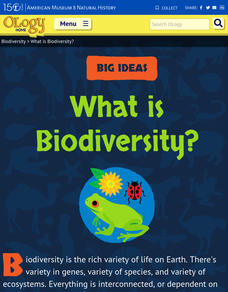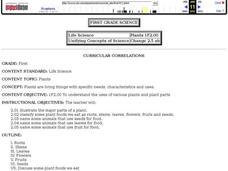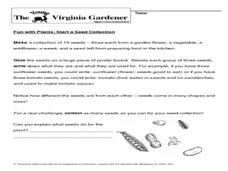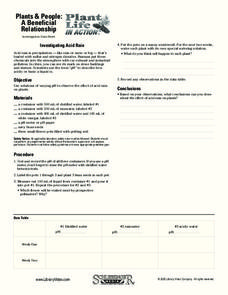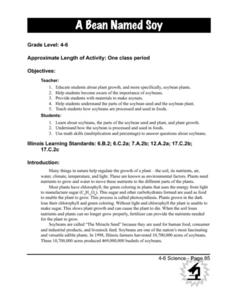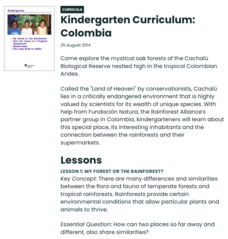American Museum of Natural History
What is Biodiversity?
Not all dogs are the same just like not all finches are the same. An interactive online lesson helps individuals learn about the causes and limitations to biodiversity. The clickable sections describe the basics of the genetics of...
Curated OER
The Dirt on Plants
Students draw and label the four parts of a plant. They describe changes that are part of the common life cycle. Students follow various one and two step directions. They are asked to discuss that they can recall about plants.
Curated OER
From One Seed Grow Many Seeds
First graders practice identifying plants by singing a song. In this plant life instructional activity, 1st graders sing the song "Parts of a Plant" which is based on the anatomy of sunflowers. Students discover agriculture techniques...
Curated OER
Estimation of Population Growth by Counting Offspring: Seed Multiplication
Students analyze a multi-seeded fruit, such as tomato, pepper, squash, watermelon, etc. They remove and count the seeds from the fruit and hypothesize/calculate the reproductive rate of that organism.
Curated OER
How Does a Seed Grow Into a Plant?
Second graders explore how seeds grow into plants. They discuss types of seeds and place seeds in wet paper towels to germinate. They draw a picture in their journal to record their observations for four days. They take pictures of their...
Curated OER
Soggy Seeds
Students conduct experiments to learn about seed germination. In this seed germination lesson, students write a hypothesis for the seed experiment. students complete the experiment for seed germination and graph the data obtained from...
Curated OER
Plants
Learners illustrate the major parts of a plant, classify some plant foods we eat as roots, stems, leaves, flowers, fruits and seeds. They also name some animals that use seeds, leaves, and fruit for food.
Curated OER
Non-Seed Vascular Plants
In this non-seed vascular plant instructional activity, students review the characteristics of sporophytes, lycophytes, sphenophytes, and pterophytes. This instructional activity has 19 fill in the blank, 4 true or false, and 2 short...
Curated OER
Growing Tomatoes from Seed
In this growing tomatoes worksheet, learners experience and participate in the process of growing tomatoes over a three or four month span of time. Students follow six directives in producing tomato plants.
Curated OER
Fun With Plants: Can You Find?
In this plants instructional activity, students find plants with specific plant parts and press and dry them to the sheet. Students find 14 different plant parts.
Curated OER
Start A Seed Collection
For this start a seed collection worksheet, students collect, label and display 15 seeds 3 each from a garden flower, a vegetable, a wildflower, a weed and the kitchen, and observe the differences.
Curated OER
Plants
Third graders study the factors necessary for plant growth and how plants adapt to their environment. They examine ow different plants require different environments to thrive.
Curated OER
Light Plants and Dark Plants, Wet Plants and Dry Ones
Young scholars plant sunflower seeds in plastic cups, and once germinated, these are exposed to different conditions of light levels and/or soil moisture contents. Students measure growth of the seedlings every few days using...
Curated OER
Special Seeds
Students create their own garden. In this gardening lesson, students get a packet of seeds and plant them in a special part of the garden. They are responsible for watering, weeding, and caring for their plants.
Curated OER
Introduction to Seeds
Students investigate how to plant a seed. In this gardening lesson, students listen to the book I'm a Seed and research the materials needed to plant a seed. Students present the information they found.
Curated OER
Plant Life In Action
Int his plant worksheet, students folllow the given directions to create an experiment. Students then answer 5 short answer questions and complete the given data table with results for two weeks.
Alabama Learning Exchange
What do Plants Need?
Students plant seeds and watch them sprout. Once growing plants are placed in different conditions and students record data about their growth. They graph the data.
Curated OER
Room to Grow
Students examine radish plants and compare how they grew based on how closely the seeds were sown. In this life science lesson, students pretend to be growing plants crowded together, then examine how the radishes look based on how much...
Curated OER
The Seed Connection
Second graders investigate the best conditions for growing plants while considering how math, science, and technology are interrelated in this study. They partner with an upper grade through the use of the Internet and conduct a...
Curated OER
Ready for Roots
Fourth graders sort seeds and predict what conditions are needed for them to germinate. They keep the seeds moist, observe and measure their growth and graph the results. As the seeds start to grow students compare and contrast the each...
Curated OER
Soybeans: The Miracle Seed
Students discover why soybeans are called the "miracle seeds." They make their own soynuts and share other foods made from soybeans. They create a bulletin board of soybean products.
Curated OER
Will It Grow?
Fifth graders conduct experiments involving plants. In this science instructional activity, 5th graders design an experiment involving plants. Students use the scientific method to design their experiments.
Curated OER
My Forest or the Rainforest?
Students explore the flora and fauna of temperate forests and rainforests. They examine the environmental conditions that allow certain plants and animals to live in the rainforest.
Curated OER
Plant Diversity and Distribution
Learners construct a defined plot on school grounds and observed patterns in plant life. They count trees, shrubs, cacti and record on a data sheet. They compare data and generate a plant diversity overlook for their school.


